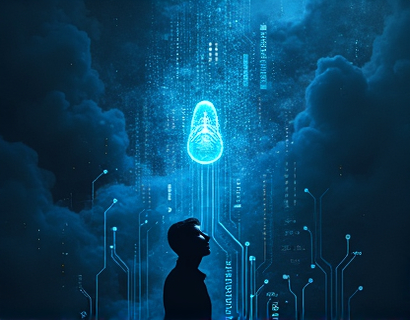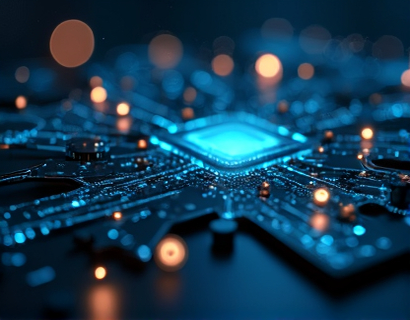AI-Driven Personalized Learning: Transforming Education Through Adaptive Technology
In the rapidly evolving landscape of education, the integration of artificial intelligence (AI) has emerged as a transformative force, offering personalized and adaptive learning experiences that cater to the unique needs of each student. This shift towards AI-driven personalized learning is revolutionizing the way we approach education, making it more accessible, engaging, and effective for students of all ages and backgrounds. By leveraging advanced algorithms and machine learning techniques, these platforms can analyze individual learning patterns, preferences, and progress, delivering tailored educational content that adapts in real-time to meet the learner's evolving requirements.
The core principle behind AI-driven personalized learning is to create a supportive and dynamic educational environment that recognizes and responds to the diverse learning styles and paces of students. Traditional classroom settings often struggle to accommodate the wide range of abilities and learning preferences within a single group, leading to a one-size-fits-all approach that can leave many students behind. In contrast, AI-driven platforms use data-driven insights to identify each student's strengths, weaknesses, and learning preferences, allowing for a more nuanced and effective educational experience.
One of the key benefits of AI-driven personalized learning is the provision of instant feedback. Unlike human instructors who may not always have the time to provide immediate and detailed feedback, AI systems can offer real-time assessments and corrections, helping students to understand and correct their mistakes as they occur. This immediate feedback loop is crucial for reinforcing learning and preventing the solidification of misconceptions, thereby accelerating the learning process and improving overall outcomes.
Moreover, AI-driven platforms can adapt the difficulty and type of content presented to the student based on their performance and engagement levels. For instance, if a student is quickly grasping a particular concept, the system can introduce more challenging material to keep them engaged and prevent boredom. Conversely, if a student is struggling with a topic, the platform can provide additional resources, examples, and practice exercises to reinforce understanding. This adaptive approach ensures that each student is consistently challenged yet supported, fostering a growth mindset and boosting confidence.
The personalized nature of AI-driven learning extends beyond just content adaptation. These platforms can also tailor the learning experience to fit the individual's preferred learning style, whether they are visual, auditory, kinesthetic, or reading/writing learners. By incorporating a variety of multimedia elements such as videos, interactive simulations, and text-based explanations, AI systems can present information in the most effective format for each learner. This customization not only enhances comprehension and retention but also makes the learning process more enjoyable and engaging.
For lifelong learners, the benefits of AI-driven personalized learning are equally significant. In today's fast-paced world, the need for continuous learning and skill development is more critical than ever. AI-powered platforms provide a flexible and convenient way for adults to upskill or reskill, fitting learning into their busy schedules through mobile apps and web-based interfaces. The adaptive nature of these platforms ensures that learners receive content that is relevant and challenging, regardless of their prior knowledge or experience level.
Another advantage of AI-driven personalized learning is its ability to foster a collaborative and inclusive educational environment. By analyzing data from a diverse user base, these platforms can identify common learning challenges and develop targeted interventions to support all students. This data-driven approach helps educators and institutions to better understand the needs of their learners and to design more inclusive curricula that accommodate different abilities and backgrounds. As a result, education becomes more equitable, with opportunities for success available to everyone, regardless of their starting point.
Furthermore, AI-driven personalized learning can significantly reduce the workload on educators. By automating routine tasks such as grading and providing feedback, teachers can focus more on what they do best: inspiring and guiding students. This shift not only improves the quality of teaching but also allows educators to spend more time on personalized interactions with students, addressing their unique needs and fostering deeper connections. The synergy between human teaching and AI-driven support creates a powerful educational ecosystem that maximizes the potential of both learners and educators.
The implementation of AI-driven personalized learning is not without its challenges, however. One of the primary concerns is data privacy and security. As these platforms collect and analyze vast amounts of personal data, ensuring the protection of this information is paramount. Educational institutions and technology providers must adhere to strict data governance standards and implement robust security measures to build trust and safeguard user information.
Another challenge is the potential for over-reliance on technology, which could diminish the role of human interaction in education. While AI can provide valuable support and resources, the human element of teaching—empathy, motivation, and social interaction—remains essential. A balanced approach that integrates AI tools while maintaining a strong focus on human-led instruction is crucial for creating a holistic and effective learning environment.
To address these challenges and fully realize the potential of AI-driven personalized learning, ongoing research and development are necessary. Continuous improvements in AI algorithms, data analytics, and user interface design will enhance the accuracy and effectiveness of these platforms. Additionally, collaboration between educators, technologists, and policymakers is essential to develop best practices and standards for the ethical and effective use of AI in education.
In conclusion, AI-driven personalized learning represents a significant leap forward in the field of education, offering a tailored, adaptive, and supportive learning experience that empowers students to reach their full potential. By leveraging the power of AI, we can create a more inclusive, engaging, and effective educational system that prepares learners for the challenges of the future. As this technology continues to evolve, it holds the promise of revolutionizing education for all, making high-quality learning accessible to everyone, everywhere.










































